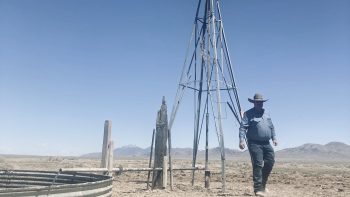Funny-looking clam fetches top dollar in China
Share Now on:
Funny-looking clam fetches top dollar in China
Kai Ryssdal: We come now to geoducks. They’re shellfish. Clams, to be precise. Really big ones. Funny-lookin’, too. They were also worth $28 million to the state of Washington last year, which makes ’em ripe for poaching.
Ashley Ahearn reports.
Ashley Ahearn: The crew of the Abby Blue is checking in after a busy morning on the water. They’re pulled up alongside a vessel from the state Department of Natural Resources.
Blain Reeves is tallying up the Abby Blue’s harvest.
Blain Reeves: 826 pounds in almost a half-a-day. They were working hard.
We’re out on a 150-acre section of water in South Puget Sound. Five other boats are anchored around us. Seventy feet below the surface, divers are digging geoducks out of the muck. Once the crew finds out I’ve never seen a real geoduck up close, they quickly shove one of these crazy creatures into my hands.
Ahearn: Oh my god.
Crew member: Be careful they spit and they have teeth or fangs.
For the record, geoducks do not have teeth or fangs. Their bodies are brownish white blobs that spill out of their shells, like a fat man wearing a very small overcoat. Out one end of the shell a long rubbery neck stretches almost 2 feet.
Ahearn: So how old is this one?
Crew members: 40? Yeah, that’s what I’d say. About 40 years.
It’s what you might call middle-aged. Geoducks can live to be more than 150 years old. They spend their whole lives in one place — buried a few feet below the sand, their long necks reaching up to suck nutrients out of the water. Northwestern coastal waters are littered with these creatures. In China they’re a delicacy selling for around $150 a pound. That’s led to a rise in poaching and illegal exports in Washington.
Mike Cenci heads up enforcement operations for these clams at the state Department of Fish and Wildlife. He says that not long ago biologists were out checking a tract to see how the stocks were recovering after a recent harvest. They were shocked to see evidence of digging in the closed section.
Mike Cenci: Over 800,000 pounds of geoduck biomass appeared to be missing. That’s about a $21 million loss that somebody lined their pockets with.
Cenci’s seen it all. Some poachers will harvest in the middle of the night. Some will harvest during the day legally. But instead of bringing all their clams to the surface to be weighed and paid for, they’ll leave big bags of clams underwater and go back and pick them up after dark. Law enforcement can’t keep up. Documents get falsified, geoducks are smuggled onto airplanes in Seattle and flown to China — almost as soon as they’re harvested.
Cenci: Unfortunately, because natural resources unlike human beings can’t say ‘Hey, we are in trouble.’ We don’t recognize there is a problem until something is almost gone. Slow growing, long-lived, valuable. You’re a target for the bad guys.
And the bad guys are making big bucks off these funny-looking clams.
In Seattle, I’m Ashley Ahearn for Marketplace.
There’s a lot happening in the world. Through it all, Marketplace is here for you.
You rely on Marketplace to break down the world’s events and tell you how it affects you in a fact-based, approachable way. We rely on your financial support to keep making that possible.
Your donation today powers the independent journalism that you rely on. For just $5/month, you can help sustain Marketplace so we can keep reporting on the things that matter to you.


















